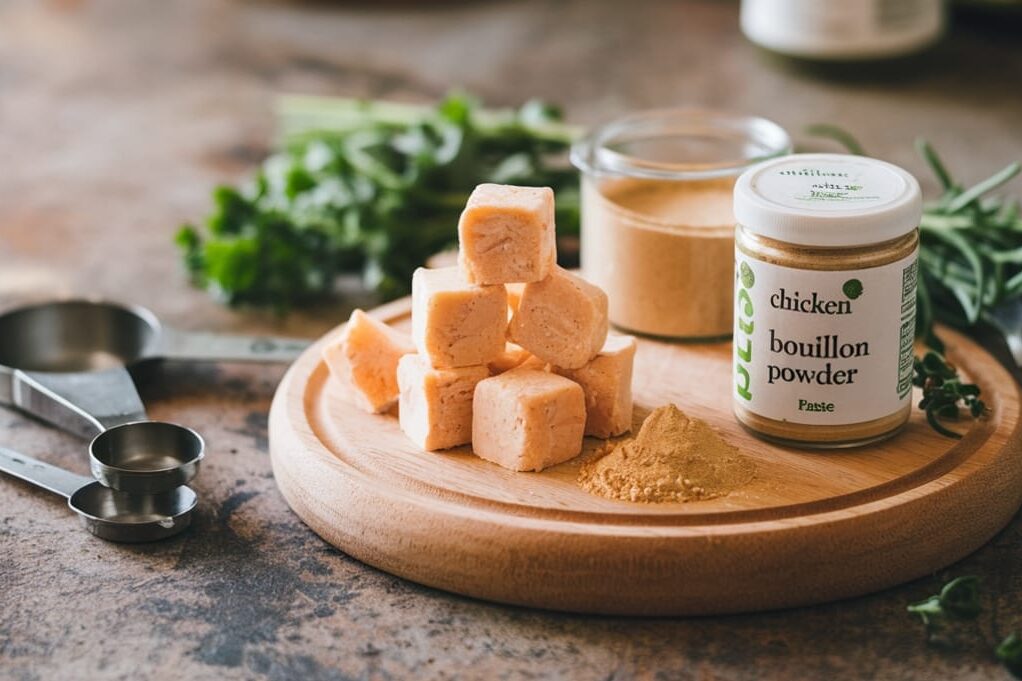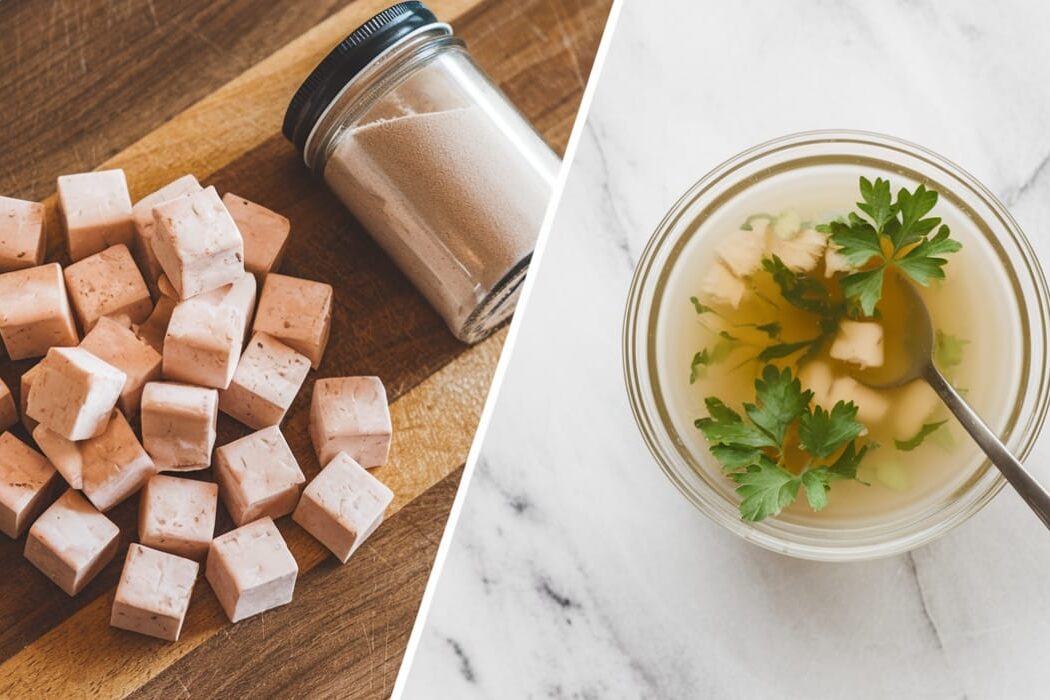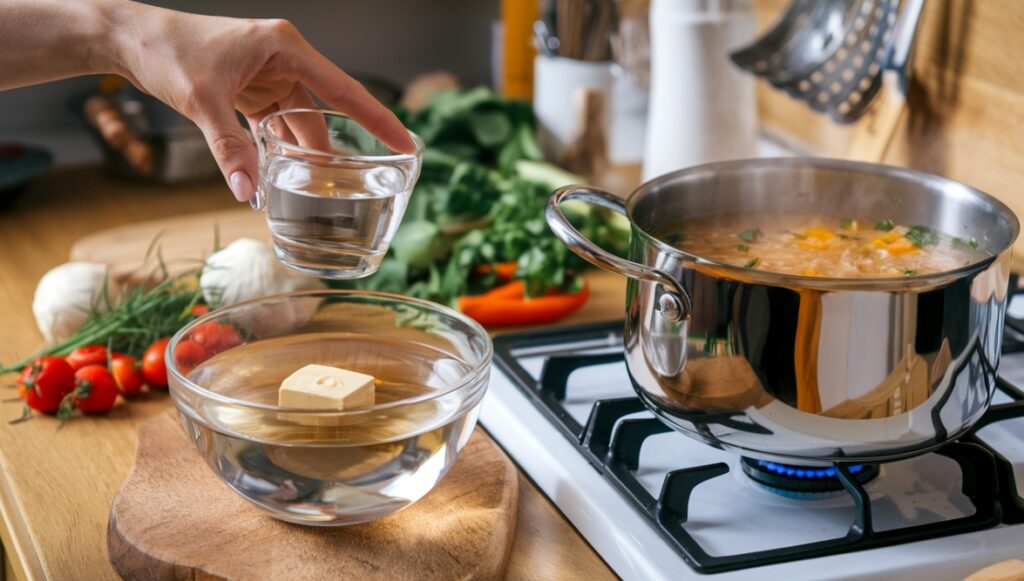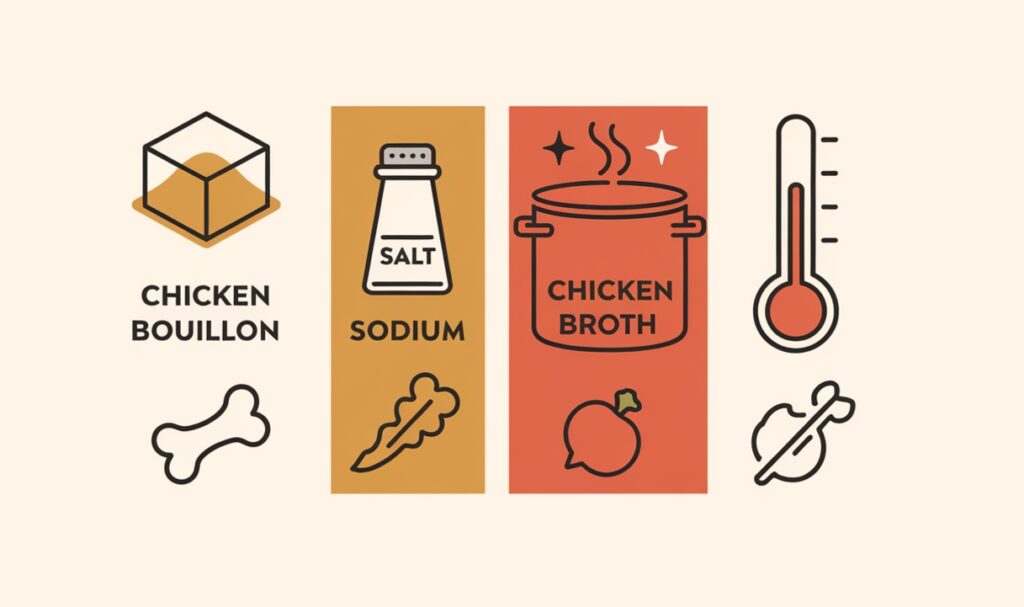Is chicken bouillon vs broth? This common question arises in kitchens around the world due to their similar uses and ingredients. While both enhance flavor in recipes, they have distinct characteristics and uses. In this guide, we’ll explore the differences between chicken bouillon and chicken broth, their culinary applications, and how to decide which one is right for your cooking needs.
Table of Contents
What is Chicken Bouillon?
Definition and History of Chicken Bouillon
Chicken bouillon is a seasoning made from concentrated chicken stock or broth that is dried and shaped into cubes, granules, or powder. The term comes from the French word “bouillir,” which means “to boil.” These convenient flavor boosters are used worldwide to quickly add a rich chicken taste to dishes.
Learn more about related options for bouillon and broth in Chicken Stock Cubes vs. Broth Concentrate.
Forms and Varieties of Chicken Bouillon
Here’s the revised version with added transition words to improve flow and readability:
- Cubes: This is the most common form and is ideal for dissolving in hot water. Additionally, it’s easy to use in recipes that require a quick flavor boost.
- Powder: On the other hand, powder is easier to measure and mix directly into dishes, offering more versatility in cooking.
- Paste: Finally, paste provides a more concentrated version, delivering deeper and richer flavors for dishes that need an extra punch.
Ingredients in Chicken Bouillon
Chicken bouillon typically contains:
- Dehydrated chicken stock or meat
- Salt
- Monosodium glutamate (MSG)
- Seasonings (onion, garlic, herbs)
- Additives for preservation and consistency
What is Chicken Broth?Definition and Traditional Preparation
Chicken broth is a liquid made by cooking chicken meat, bones, vegetables, and spices in water. It has a mild, savory flavor and is a key ingredient in many Western and Asian dishes. Unlike bouillon, broth is usually fresh and liquid, though it is also available in canned or boxed versions.

How Chicken Broth is Made
The preparation of chicken broth involves:
- Here’s the revised version with added transition words for better flow:
- Simmering chicken: Start by simmering chicken, with or without bones, for several hours to extract its natural flavors.
- Adding vegetables: Next, include vegetables such as onions, carrots, and celery to enhance the broth’s taste and depth.
- Straining the liquid: Finally, strain the liquid to remove any solids, leaving behind a clear and savory broth ready to use.
Ingredients in Chicken Broth
- Fresh chicken (sometimes just bones)
- Aromatics like onion, garlic, and herbs
- Optional salt or seasoning
Key Differences Between Chicken Bouillon and Chicken Broth
Texture and Form
One of the most apparent differences between chicken bouillon and chicken broth lies in their physical form.
- Chicken Bouillon: Found in dehydrated formats such as cubes, powder, or paste, bouillon is compact and easy to store. It requires rehydration with water to resemble broth.
- Chicken Broth: Liquid by nature, broth is ready to use directly from the pot, carton, or can without the need for preparation.
Flavor Concentration
- Chicken Bouillon: Tends to have a more intense, salty flavor due to its concentrated form and added seasonings like MSG. This makes it ideal for dishes where strong flavor is necessary in small amounts.
- Chicken Broth: Offers a milder, more natural flavor, especially when made fresh. It’s preferred for delicate soups or as a standalone beverage.
Preparation and Cooking Process
- Here’s the revised version with added transition words:
- Chicken Bouillon: This option is made by dehydrating ingredients and often contains preservatives as well as artificial flavor enhancers. Moreover, it dissolves easily in hot water and can be conveniently added directly to dishes for seasoning.
- Chicken Broth: In contrast, chicken broth is usually homemade by simmering chicken and vegetables, or it can be purchased pre-made. Furthermore, it is less processed and focuses on natural ingredients and traditional preparation methods.

Additives and Nutritional Content
Here’s the revised version with added transition words:
- Chicken Bouillon: This option often includes sodium, MSG, and other additives to prolong shelf life and enhance flavor. However, its high sodium content and artificial ingredients may be a concern for some individuals.
- Chicken Broth: On the other hand, fresh or homemade versions are typically free from additives. As a result, they are a healthier choice for those monitoring their sodium intake or looking to avoid artificial ingredients.
Storage and Shelf Life
- Chicken Bouillon: Extremely shelf-stable and can last months or even years when stored properly. Ideal for stocking a pantry.
- Chicken Broth: Requires refrigeration once opened and has a shorter shelf life. Homemade broth may need freezing to preserve freshness over time.
When to Use Chicken Bouillon
Versatile Cooking Applications
Chicken bouillon is a convenient solution for a variety of dishes, especially when time or resources are limited.
- Soups and Stews: Bouillon is perfect for adding deep flavor to broths when starting with plain water.
- Sauces: Dissolved bouillon can elevate gravies, pan sauces, or cream-based recipes.
- Casseroles: A dash of bouillon powder enhances the overall taste of baked dishes.
- Quick Cooking: Its fast preparation makes it ideal for instant noodles, rice, or seasoning marinades.
Advantages of Using Chicken Bouillon
- Convenience: Ready in seconds without the need for lengthy simmering.
- Space-Saving: Compact and easy to store in small kitchens.
- Economical: A budget-friendly alternative to fresh or pre-made broth.
Best Practices for Using Chicken Bouillon
- Dilution Ratios: Follow package instructions to achieve the right flavor concentration. Overuse can result in overly salty dishes.
- Enhancements: Pair with fresh herbs, spices, or vegetables to mimic the depth of homemade broth.
When to Use Chicken Broth
Ideal Scenarios for Chicken Broth
Chicken broth excels in recipes requiring a fresh, mild, and naturally savory liquid base.
- Drinking Alone: Warm chicken broth is a soothing beverage, often consumed during illness or fasting.
- Soups and Clear Broths: Broth’s subtle flavor forms the perfect foundation for chicken noodle soup, miso soup, and other light dishes.
- Cooking Grains and Vegetables: Using broth instead of water to cook rice, quinoa, or steamed vegetables enhances their taste.
- Flavor Enhancer: Adds richness to braised meats, slow-cooked dishes, and stir-fries.
Advantages of Using Chicken Broth
- Natural Taste: Complements delicate ingredients without overpowering them.
- Nutritional Benefits: Homemade broth retains collagen and minerals from chicken bones, offering health advantages.
- Customizable: Can be tailored to personal tastes by adjusting ingredients and seasoning.
Storing and Preserving Chicken Broth
- Refrigeration: Store fresh or opened broth in the fridge for 3–4 days.
- Freezing: Extend its shelf life by freezing in airtight containers or ice cube trays for portioned use.
Substituting Chicken Bouillon for Chicken Broth (and Vice Versa)

Substituting Chicken Bouillon for Chicken Broth
Chicken bouillon is an excellent substitute for chicken broth, especially when convenience is a priority. Here’s how to make the swap:
- Rehydrate the Bouillon: Dissolve one bouillon cube (or the equivalent amount of powder or paste) in one cup of hot water. This creates a liquid comparable to chicken broth.
- Adjust the Flavor: Bouillon can be saltier and more concentrated, so taste as you go and adjust seasonings in your recipe to avoid oversalting.
Substituting Chicken Broth for Chicken Bouillon
When chicken broth is used in place of bouillon, keep the following in mind:
- Liquid Adjustment: Chicken broth adds liquid directly to the dish, while bouillon can be used in smaller amounts. Adjust your recipe to account for the extra liquid.
- Enhance the Flavor: If the broth is mild, consider adding a pinch of salt, garlic powder, or onion powder to achieve the stronger flavor profile of bouillon.
Tips for Successful Substitution
- Keep the Ratios: Use 1 cup of rehydrated bouillon for every 1 cup of broth needed.
- Choose Based on the Dish: For light dishes like clear soups, fresh broth delivers better results. For hearty recipes like stews or casseroles, bouillon works well.
- These simple adjustments ensure your recipe maintains its flavor and texture, no matter which substitute you choose.
Nutritional Comparison Between Chicken Bouillon and Chicken Broth
Sodium Content
- Chicken Bouillon: Typically high in sodium due to the inclusion of salt and preservatives. One cube or teaspoon can contain up to 40% of the recommended daily sodium intake.
- Chicken Broth: Lower in sodium, especially in homemade or low-sodium store-bought varieties, making it a better option for those with dietary restrictions.
Calorie and Nutrient Content
- Chicken Bouillon: Minimal calories, as it primarily provides flavor rather than nutrients. It lacks the collagen, protein, and minerals found in broth.
- Chicken Broth: Contains slightly more calories but offers nutritional benefits like protein, collagen, and trace minerals from bones and vegetables.
Health Considerations
- Bouillon: Best used in moderation due to its high sodium content and artificial additives.
- Broth: A healthier choice overall, especially when homemade, as it’s free from preservatives and can be enriched with nutritious ingredients like vegetables and herbs.

Popular Brands and Availability
Top Chicken Bouillon Brands
- Knorr: Known for its flavorful and versatile bouillon cubes and powders.
- Maggi: Offers a wide range of bouillon products, including paste and granulated options.
- Better Than Bouillon: A premium option with paste-style bouillon made from real chicken.
Top Chicken Broth Brands
- Swanson: A well-loved brand offering traditional and organic chicken broth options.
- Pacific Foods: Known for its low-sodium and organic chicken broths.
- Kettle & Fire: Specializes in slow-simmered broth made with organic chicken and bones for added nutrients.
FAQs
Is Chicken Bouillon Healthier than Chicken Broth?
Chicken broth, especially when homemade, is often viewed as the healthier option. It contains natural ingredients and nutrients like collagen and minerals, which are beneficial for digestion and joint health.
In contrast, chicken bouillon is a convenient choice but typically contains artificial additives, preservatives, and higher levels of sodium. For this reason, it’s best to use bouillon in moderation, particularly for individuals watching their sodium intake or aiming to avoid processed ingredients.
Can I Use Chicken Stock Instead of Bouillon or Broth?
Yes, chicken stock can replace either bouillon or broth in most recipes. It is richer and more gelatinous than broth, offering deeper flavor and better texture.
For more health-related insights, check out Oatmeal for Weight Loss or Health Benefits of Oats and Oatmeal.
How is Chicken Stock Different from Chicken Broth?
Chicken stock is made by simmering bones, which gives it a richer texture and higher collagen content. Broth is made using meat and has a lighter, more delicate flavor.
Does Chicken Bouillon Contain MSG?
Many commercial chicken bouillon products include monosodium glutamate (MSG) as a flavor enhancer. Look for “no MSG” labels if you wish to avoid it.
What’s the Best Way to Store Chicken Broth?
Homemade chicken broth can be refrigerated for up to 4 days or frozen for up to 6 months. Store-bought broth should be used by the expiration date and refrigerated after opening.
Can I Drink Chicken Bouillon as a Beverage?
While not as common as drinking chicken broth, you can dissolve bouillon in hot water for a quick, flavorful beverage. However, keep an eye on the sodium content.
Conclusion
Chicken bouillon and chicken broth each have their own unique qualities and uses in the kitchen. While bouillon offers unmatched convenience and bold flavor, broth shines in recipes requiring a natural, mild base. Knowing their differences and how to substitute between them empowers home cooks to choose the right ingredient for every dish. Whether you’re whipping up a quick soup or preparing a slow-cooked masterpiece, both options have their place in a well-stocked kitchen.

